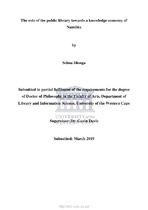The role of the public library towards a knowledge economy of Namibia
Abstract
Access to knowledge and information is found to be the cornerstone in the road to knowledge
economy transformation whereby the utilization of knowledge is the key engine of economic
growth, where knowledge is acquired, created, disseminated and used effectively to enhance
economic and social development. This means that the more people acquire knowledge, the
more they will begin producing new products or improving systems and existing products, thus
adding value to local products and improving the GDP of the country, as well as improving
their social livelihood. Therefore, the primary role public libraries have is being the knowledge
hubs, to make provision of higher quality knowledge and to make information accessible to the
public to equally contribute to all NDPs towards achieving the Namibia Vision 2030 for a
knowledge economy.
This research study discusses “The contribution of the Public Library services towards a
knowledge economy transformation readiness which is envisaged by the Namibia Vision 2030.
In achieving that, the study has investigated the state of the Namibia legislative and policy
framework reflections of access to knowledge and information as provided by libraries. The
study further examines the availability and accessibility of knowledge and information
resources, including ICT infrastructure at public libraries in remote rural areas. Moreover, it
discusses the types of education and training programmes conducted by public libraries in
ensuring that users have the necessary information and retrieval searching competencies and
skills for accessing and navigating available information infrastructural resources. Finally, it
explores innovation systems, technologically and non-technologically initiated by librarians
for library services enhancement, and how library users have tapped into the growing stock of
knowledge and information, and adapted them to local needs for economic and social
development.
The study has employed the four pillars of the World Bank Knowledge Economy Framework,
namely an economic and institutional regime; information, knowledge and ICT infrastructure;
education and training, and an innovation system as the lenses through which to investigate the
research questions understudied.

